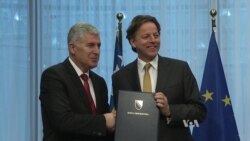Bosnia and Herzegovina applied this week to join the European Union — the latest of the former Yugoslav states to seek a future in the bloc. While the move was welcomed in both Sarajevo and Brussels, significant hurdles lie ahead.
Twenty-one years after the end of the war that cost an estimated 100,000 lives, the chair of Bosnia and Herzegovina’s presidency, Dragan Covic, pledged Monday to work toward a future in the European Union.
He said that 2016 would be a year of significant reforms for Bosnia and Herzegovina, adding that the government would not stop on this road because Bosnia wanted to catch up with its neighbors.
EU foreign policy chief Federica Mogherini warmly welcomed Bosnia’s application.
"Seeing that with our immediate neighborhood there is such an energy and willingness to join and work hard to adapt the country's society, economy, institutions, systems to the European standards gives us the sense of responsibility we have also towards our European Union citizenship," said Mogherini.
Both sides recognized that Bosnian membership in the EU was several years away, said James Ker-Lindsay of the London School of Economics.
“There have been a lot of areas of improvement but there’s also a lot that’s still very, very wrong with the country and I think the European Union sees this as a good opportunity to try to take forward the process of reconciliation,” he said.
In Sarajevo, there was some skepticism that the country’s divided politicians could compromise.
A Sarajevo resident said that "with our mentality and with our politicians, I think we will never live to see the day we join the EU.”
Under the U.S.-brokered 1995 Dayton Peace Agreement, administration of the country was split between the Federation of Bosnia and Herzegovina — with mostly Croats and Bosnian Muslims, or Bosniaks — and the Republika Srpska, with a Serb majority.
That system will have to change if Bosnia is to join the EU, said Ker-Lindsay.
“So what’s happening is that, for example, the Bosniak community wants to try to centralize power as much as possible; they resent the Bosnian Serbs having their own entity. Meanwhile, the Bosnian Serbs jealously guard any powers that they have, and they don’t want to give those up, even if it’s in the name of EU accession,” he said.
More than a million Bosnians fled the country during the war. As Europe grapples with its current refugee crisis, diplomats in Brussels see Bosnia and Herzegovina’s application as an endorsement of the bloc’s founding principles of peace and reconciliation.





